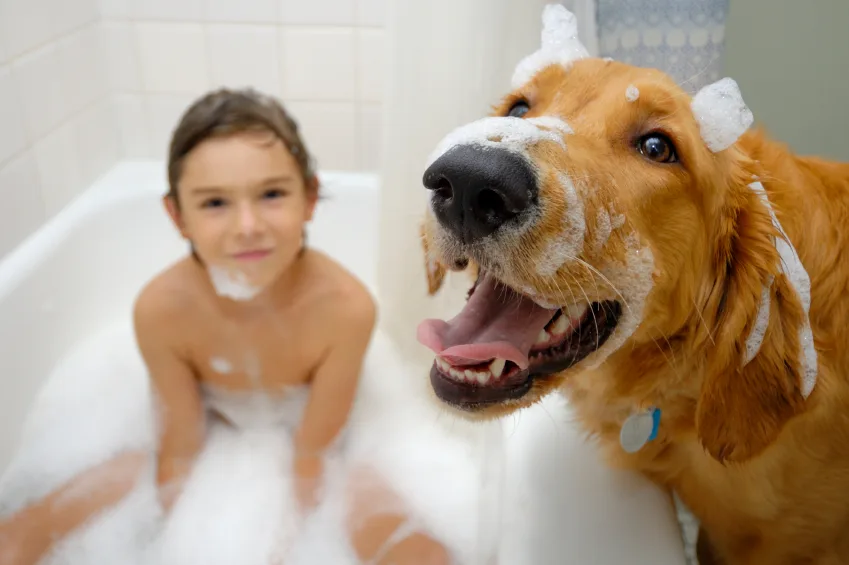Dogs make great companions for children, as they provide enjoyment. Learning how to care for a pet helps kids develop skills that they can transfer to other areas of their life. Taking care of a pet can help kids develop self-esteem, confidence and a greater sense of responsibility.
You know your dog enriches your life because you love spending time with her. She’s funny, comforting, fun, dedicated, and loyal, too. Even if you have a dog that occasionally frustrates you (hello, chewed shoes) or makes you question your own sanity after an extensive run, it’s difficult to see how anyone could improve upon the experience of owning a truly good dog.
But improve, we shall, especially when it comes to the lives of your kids. As it turns out, little ones may stand to benefit from life with a dog in surprising and incredibly interesting ways. It isn’t all about responsibility (though that’s an important lesson to learn through owning a pet); there’s health and development benefits, too.
Without further adieu, we give you ten ways dogs improve your kid’s lives directly. If you’re considering adopting a dog, these might just turn into “ten great reasons to adopt” along the way.
1) Reduction in Asthma Rates
There’s at least some evidence to show that when children spend time with dogs regularly early in life, it may lessen their risk for childhood or asthma later on. Originally, researchers believed that owning a dog could actually increase the risk for asthma; this is just one of the reasons doctors used to recommend a pet-free home for children with mild breathing issues, allergies, and repeated childhood colds.
However, in a 2015 JAMA Pediatrics study, author Cecilia Lundholm flipped the train of thought – providing instead that children who lived with dogs were up to six times less likely to experience asthma later in life.
Of particular importance was the how and when; in order to gain the most benefit, children had to be exposed to dogs during the first year of life. The same study showed that similar benefits were gained by children who were exposed to other animals, including cats, horses, cows, and other farm animals, making children who live on farms especially well-protected.
Does this mean that every child will benefit from owning a dog? Well, no. Correlation doesn’t necessarily equal causation, and children who are truly allergic to animals certainly won’t benefit. But it does mean that it’s okay to test your child around dogs (always use properly safety protocol) earlier in life than we may have once believed.
2) Improved Cognitive Development
This study shows that early exposure to family dogs may actually improve your child’s cognitive development. That means a potential boost in two key early childhood milestones: perspective-taking abilities and intellectual development.
In terms of the first few years, that means owning a dog could very well help your child develop talents like compassion, problem-solving, and helping others earlier than other children of the same age who don’t own a dog.
The same review also provided evidence that showed a link between dog ownership and better canine and childhood social skills. Since kids often play with dogs on a daily basis, and treat them similarly to other children when it comes to imaginative play, such a link makes sense!
3) Respect for Others
Children who live in homes with dogs also learn how to respect other beings early in life. As a parent, you teach your child how to interact with your dog(s) with respect from an early age; don’t hit them, don’t yell around them, and don’t throw things at them (throw for them instead).
Although these lessons may seem simple and contrite, from an early childhood development, they can help your little one to develop respect for other people earlier, too.
Later on, your child learns how to properly care for her dog, feeding her, bathing her, and taking her to the vet. That encourages compassion and empathy, two critical traits in developing respect.
It isn’t just about respect for others, either; developing respectful personality traits in general may also benefit self-esteem and self-respect. That leads to a more confident, motivated child!
4) Sensory Support/Emotional Regulation
Let’s face it: children don’t always have the best ability to regulate their emotions. They experience emotional outbursts that often stem from being tired, or hungry, or stressed…or heck, sometimes even wearing the wrong color shirt.
Despite the fact that these behaviors may leave you more stressed-out than they are, they’re actually a normal part of early childhood development. It’s through these episodes that your child learns to self-soothe and regulate their emotions.
So, how can owning a dog benefit this process? Well, it depends on the dog’s personality. A patient, loving dog who will “lend a paw” to comfort a crying dog makes it easier for your little one to weather the storm. It’s an instant best friend that’s always at home and at the ready when something goes wrong.
Considering that petting a dog for just a few minutes can slow heart rates and lower blood pressure, being able to snuggle up with a pup when your child is feeling sad or angry may also help him to come out of the emotional outburst faster.
There is one caveat: children must be old enough and reliable enough to maintain respect for your dog’s space and safety, even when they’re emotional. Even the most friendly dog can react in fear to a child that strikes out at it, so sensory support and emotional regulation benefits are probably best for kids over the age of around seven.
5) Symbiotic Active Living Benefits
Today’s parents worry about the amount of time kids spend in front of electronic devices. Add to that rising rates of obesity and falling rates of early childhood activity. But trying to motivate your child to stay active when the call of video games and movies is so persuasive isn’t always easy.
It’s also not always easy to provide your dog with the right level of exercise, especially if you lead a busy life. But just not taking the dog for a walk everyday? That’s not an ideal option. Sure, you could do doggy daycares (and you should; playdates are great for your pup), but if you have a little one, your child and little one will naturally encourage each other to stay active as they grow up together.
Even just a couple of 15-minute naturally-inspired play sessions per day are enough to increase activity levels for both your child and your dog. So encourage them to play together, whether it’s in the living room with a rope knot or in a fenced-off backyard where they can chase each other. It’s good for both of them!
6) Improves Confidence
Taking care of a dog helps a child develop a sense of confidence. When a kid cares for their dog, they become more confident in their abilities to provide care to others.
7) Increases Responsibility
Family pets teach children how to be responsible for a living creature. Most children have an intense interest initially in caring for an animal, but long-term animal care requires responsibility. Children learn that loving another creature involves more than just playing with it. Dogs require routine care and feeding. Being responsible for these tasks teach kids how to follow routines. The sense of responsibility kids get from taking care of their dogs often transfers to other parts of their lives.
8) Learn Physical Health
Kids learn about physical health when caring for a dog. They learn the importance of daily water in staying hydrated. Kids may learn about vitamins and supplements and the importance of regular check-ups with the doctor.
9) Teaches How to Deal With Emotions & Behaviors
Supervising animals helps children learn how to deal with emotions and behaviors. Many animals, including dogs, display emotions similar to humans. Children learn to recognize the signals when a dog gets frustrated or angry. A dog that is well-trained can help children learn about appropriate behaviors and good citizenship.
10) Great Exercise Partners
A dog can be the key to getting your kid away from the video games and off the couch. Dogs, in particular, need regular exercise and playtime. Playing in the park and taking the dog on walks helps kids stay active. According to research in the International Journal of Behavioral Nutrition and Physical Activity, having a pet is strongly correlated with teens being more active.
Having a dog as part of the family can be a great experience for kids as there are many benefits of dogs. If you do decide to get a dog, consider dog training programs, as they can help teach your dog suitable behavior around your kids.
Need more great reasons to adopt a dog? Speak with a breeder and learn just how wonderful life with a dog can be. From adorable puppy hood looks to the bond between senior pups and their owners, there’s so much to love.

